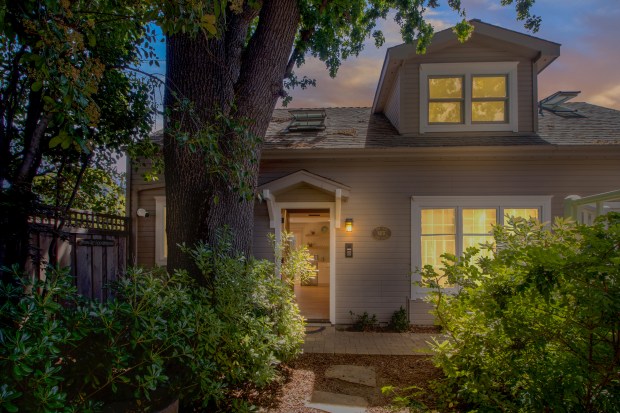Tucked away behind a storefront on University Avenue in Los Gatos, is a fully equipped smart home showroom that highlights what leveraging the connectivity of the internet in the home can do to make life easier.
CyberManor’s 1,300-square-foot smart townhouse has everything from a television hidden inside the bathroom mirror and a smart refrigerator that senses when you’re running out of milk to a high-tech espresso machine that can be controlled from your phone.
While it may seem like it’s out of a sci-fi movie, thousands of multimillion-dollar homeowners in the Bay Area are bringing this technology into their daily lives. The cyberManor showroom is listed on Airbnb for folks who want to experience what life in a smart home is like for $195 a night.
“That’s kind of the endgame of everything we’ve tried to do,” cyberManor President Gordon van Zuiden said. “It’s created in a very simple fashion, a very powerful tool that makes living in your home more enjoyable.”
The showroom was named the best in the country earlier this year by the Consumer Technology Association. The group gave cyberManor the Mark of Excellence Award for 2022, which recognizes the best in custom integration and installed technology.
“When they say that we’ve developed something here that really is unique and has value, then it’s a prestigious award for us,” van Zuiden said.
CyberManor creates a central hub for all the different apps and technology that you can bring into your home, such as music streaming, smart doorbells, automated lights and window blinds. Instead of opening several different apps to do everything for your home, you can instead do it all from one centralized app.
“Once water was controlled and introduced into the home, then plumbing became a profession,” van Zuiden said. “So that infrastructure of plumbing for water is really the same thing that we’ve provided for the internet.”

Construction on the showroom began in 2016 with the help of Gary Kohlsaat Architects, Lydia Lyons Design and Stan Lundgren Construction.
The one-bedroom, 1 1/2-bathroom showroom utilizes voice-command technology that can trigger the blinds to close and the lights, backyard fountain feature, music and AC to turn off—all with the simple voice command, “I’m leaving.”
Guests can even preheat the oven from their phone as they drive home from the grocery store to cook dinner, van Zuiden said. The toaster has a touch screen with pictures of different breads, bagels and pastries that you can heat up.
The TV can be rotated from its place in front of the living room couches to face the kitchen with the press of a button, and the upstairs loft room has an ultra short-range projector that transforms the room into a home theater.
Outfitting homes with smart technology can cost anywhere from $150,000 to $200,000, van Zuiden said.
Security and safety are both major drivers for people to get these systems put in their homes, he added. The company can install security cameras and safety features like “light recording,” which records the pattern of lights used in the home throughout the day and re-creates those movements when the homeowner is on vacation to deter burglars.
While bringing in that much technology into the home comes with its own risks, Van Zuiden said that in his time at cyberManor, he’s never had a customer bring up security breaches.

“We always try to do best practices. It’s best practice to lock your door when you leave the house; it’s not best practice to keep your door unlocked and then leave your key under a lock that’s right in front of the house,” van Zuiden said. “At the end of the day you try to create the tightest solution that you can, and you just try to make sure the benefits outweigh the risks.”
More than 30 Airbnb guests have stayed in the home since it was listed in 2021, and it was booked out for 95% of last year.
The smart home industry has evolved a lot over the past few decades, growing as new technology develops. The next phase, van Zuiden said, is customization.
Just as Amazon recommends products based on your recent purchases or Netflix gives you new TV shows to binge, the smart home of the future will be able to anticipate your needs and customize an environment based on your preferences.
While that level of technology is not immediately available, there are still ways to create a custom experience in your home right now, he said.
“You could create a scene in the morning that you push a button custom for you that says, ‘I want to turn the shower on to 103 degrees. … I want the shades to rise, I want this music to play, and I want the floor to heat to this certain temperature,’ and then by the time I get out of bed and I walk to the bathroom, that’s set for me, and it’s personalized for how I like my morning routine,” van Zuiden said.
The showroom may be new, but the concept is not. At the turn of the century when electricity was entering the home for the first time, utility companies were inviting people to see “the wonders of the iron” or “the wonders of refrigeration.” As with electricity then, van Zuiden said, technology “will completely transform the way you live in your house.”

CyberManor has worked with more than 2,000 homes in the Bay Area since it launched in 1999. They have more than 300 clients per year and are steadily growing. The smart home industry is relatively young, but people can start bringing high-level technology into their homes now.
“This isn’t Jetsons,” van Zuiden said. “We have this here now in Los Gatos; it’s in your backyard.”
Source: www.mercurynews.com
